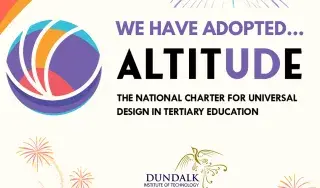Dundalk Institute of Technology Declares its Adoption of the ALTITUDE Charter & Joins the National Call to Action on Universal Design
Dundalk Institute of Technology (DkIT) has today publicly declared its support for and adoption of ALTITUDE – the National Charter for Universal Design (UD) in Tertiary Education – and joined today’s national call to action for institutions and agencies to work towards a more universally designed tertiary education system.


DkIT strongly believes that ‘inclusion is everyone’s business’, and that all staff play a role in creating an environment in which the huge diversity of learners in our community can thrive. Universal Design is central to our efforts to make that statement a reality, and by adopting the ALTITUDE Charter, we have committed to work collaboratively across the institution to embed a UD approach more firmly in our practices and processes in the years ahead, building on the good work already achieved in this area.
Commenting on the Institute’s adoption of ALTITUDE, DkIT President, Dr Diarmuid O’Callaghan, welcomed this landmark development:
“At DkIT, we embrace equality, diversity and inclusion as a core value. We are committed to ensuring that we create a vibrant campus community that is connected, safe, inclusive and caring, enriched by our diversity. In doing so, we seek to enable our students and staff to achieve their full potential through the provision of a supportive, inclusive and respectful environment that meets their needs. Embedding a Universal Design approach is a key element of our commitment to creating this inclusive experience and culture.
We are delighted to fully support this important cross-sectoral effort and will continue working to make progress on the actions and goals outlined in the ALTITUDE Charter in the years ahead.”
Following our adoption of the ALTITUDE Charter and our public support for the national call to action today, DkIT will now consider ways to bring this charter to life. We look forward to building on our achievements to date and collaborating across our community to enhance the experiences of all our staff and students.
About the ALTITUDE Charter
The Charter and Technical Report can be found here
The learner population in tertiary education is becoming increasingly diverse, and students’ lives are also increasingly complex. The responsibility on educational institutions to provide equitable access for all is now strongly embedded in Irish legislation, and national tertiary education strategies contain more specific goals to implement a Universal Design approach, (SOLAS, 2020; Higher Education Authority, 2022).
The aim is to move towards a system where ‘Inclusion is Everyone’s Business’, where all staff play their part in delivering an inclusive educational experience.
Universal Design, or UD for short, offers us an evidence-based approach to engender this mindset, and is increasingly seen as a central tenet of our response to rising diversity, (Centre for Excellence in Universal Design, 2022). But how can we embed a UD approach in our institutions?
That’s where ALTITUDE – the National Charter for Universal Design in Tertiary Education - comes in to play.
Funded by the HEA under PATH 4, the ALTITUDE Project was an extensive cross sectoral collaboration involving six national agencies, fifteen higher education (HE) institutions and six Education and Training Board (ETB) representatives, nominated by Directors of FET to represent the Further Education and Training sector. The Charter was launched in Spring 2024, alongside an accompanying technical report and implementation toolkit.
The vision of the project looks to a future in tertiary education where ‘all learners are transformatively included through universal design in education’, deriving the name ALTITUDE. It seeks to move us in that direction by supporting HEIs and ETBs to make sustainable progress towards systemically embedding a UD approach…. - one which places human diversity at the heart of tertiary education design, and fosters student success for all learners.
The ALTITUDE Charter, and the associated toolkit and technical report, build on significant existing work on UD in the Irish tertiary education landscape (Kelly & Padden, 2018), and through these outputs, provides a clear roadmap for institutions to make progress.
Drawing from national and international literature, the Charter recommends key strategic enablers, which institutions should put in place over time to support the sustainable implementation of UD, and proposes collaborative action to work towards goals under 4 key pillars of our institutions:
- Learning, Teaching & Assessment;
- Supports, Services & Social Engagement;
- the Physical Environment;
- and the Digital Environment
Institutions who adopt it will over time benefit from:
- a more unified language of and commitment to a universal design approach in their institution
- a greater culture of shared responsibility for UD, access, and inclusion, operationalising the ‘Inclusion is Everyone’s Business’ mindset.
- a more effective and learner centred approach to compliance with national legislation and policy
- and most importantly, the iterative development of programmes, services, and environments that enable equitable opportunities for all learners to thrive and be successful.
The cross-sectoral development of the ALTITUDE Charter represents a landmark moment for the tertiary education sector, signalling its intent to place human diversity at the heart of its design and delivery.
Find out more about the ALTITUDE Charter: ALTITUDE Charter - Atlantic Technological University



